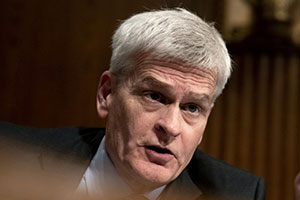Senior Reporter
ATA, Freight Stakeholders Push Back on US Senate’s PRO Act

[Stay on top of transportation news: Get TTNews in your inbox.]
Freight stakeholders are voicing opposition to a bill currently being debated in the U.S. Senate that aims to make changes to federal classification for workers.
American Trucking Associations and the U.S. Chamber of Commerce are among those countering provisions in the Protecting the Right to Organize, or PRO, Act, which — among other things — would revise the federal definitions of an employee, supervisor and employer.
“The government should respect and support the Americans who choose to become owner-operators in the trucking industry. Conversely, the government should not force those Americans out of business by insisting on the authoritarian view that employee status is better for them,” said Edwin Gilroy, ATA’s senior vice president of legislative affairs, in a letter to the Senate Health, Education, Labor, and Pensions Committee. He emphasized the bill has the potential to jeopardize the livelihoods of hundreds of thousands of owner-operators in the trucking industry, destabilizing supply chains and irreparably harming the national economy.
PROACT by Transport Topics on Scribd
The bill would define a company as the employer in cases where a franchisor is determined to be exerting substantial management in the workplace. The legislation also would expand efforts linked to collective bargaining in the workplace. In the evenly divided Senate, the legislation currently is short of the requisite votes for approval. The U.S. House of Representatives approved a version of the bill earlier this year.

Gilroy
ATA also questions the bill’s focus on the “ABC test,” which determines if a driver is an employee or a contractor through specific criteria, including if the individual works outside the company’s typical line of operations.
“The ‘ABC test’ effectively bans most independent owner-operators from working in the trucking industry, destroying the livelihoods of over 350,000 small business entrepreneurs and needlessly gutting the nation’s already fragile supply chain of its frontline essential workers,” Gilroy said.
Sean Redmond, executive director for labor policy at the U.S. Chamber, added, “There are still more parts of the PRO Act that do not enjoy public support, such as the bill’s undermining of independent contractors by deeming them to be employees for unionizing purposes and its threat to the franchise business model.”

Louisiana Republican Sen. Bill Cassidy (Stefani Reynolds/The New York Times/Bloomberg News)
During a Health, Education, Labor, and Pensions committee hearing July 22, panel member Sen. Bill Cassidy (R-La.), also pushed back on the measure.
“Inflexible work rules created a cost-disadvantage over factories, manufacturing plants that were located overseas,” he said. “You can make the case that right to work laws actually created the opportunity for manufacturing to remain in the United States because it’s not just the wage, it is also the inflexibility of work rules that make it difficult.”
During that hearing, Jyoti Sarolia, principal and managing partner at California-based Ellis Hospitality, added, “If the PRO Act becomes law, franchise brands will react by offering fewer franchises, and as a result, people like me will be collateral damage. Upending an entire business model and taking away business opportunities to people like me, just to increase union power, is unacceptable.”
Stronger organizing and collective bargaining rights could have helped change the trajectory of this pandemic and saved lives by ensuring workplace safety was a priority.
Sen. Patty Murray, Health, Education, Labor, and Pensions chairwoman
Senate Democrats, however, sought to link union membership with better pay for women and minority employees.
“Stronger organizing and collective bargaining rights could have helped change the trajectory of this pandemic and saved lives by ensuring workplace safety was a priority, more workers had paid sick days, and more workers had the wages and benefits they needed to stay economically secure, like quality, affordable health care, and a reliable retirement plan,” said Health, Education, Labor, and Pensions Chairwoman Patty Murray (D-Wash.), sponsor of the legislation.
Proponents of the bill include the AFL-CIO, which backed the House version. The group’s president, Richard Trumka, recently stated, “Our members and all working people are committed to making the PRO Act the law of the land this year.”
Sarolia cautioned against painting all workers with a broad brush.
"Put simply, businesses do not react in a vacuum,” he said.
Want more news? Listen to today's daily briefing below or go here for more info:





